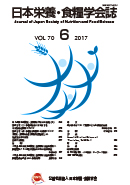
- Issue 6 Pages 257-
- Issue 5 Pages 213-
- Issue 4 Pages 139-
- Issue 3 Pages 91-
- Issue 2 Pages 53-
- Issue 1 Pages 3-
- |<
- <
- 1
- >
- >|
-
(Young Investigator Award of JSNFS (2017) )Akiko Kuwabara2017Volume 70Issue 6 Pages 257-262
Published: 2017
Released on J-STAGE: December 26, 2017
JOURNAL FREE ACCESSSome clinical studies from Europe and the United States have suggested that fat-soluble vitamins play a role in non-communicable diseases. Such studies, however, have seldom been performed in Japan. We have tried to determine the requirement for vitamin D in cross-sectional studies that measured dietary intake and circulating levels simultaneously, and also in intervention studies. Our results have suggested that the requirement for vitamin D is, in fact, three times higher than the current Japanese DRI for avoidance of vitamin D insufficiency, and that intake of a fat-restricted diet is associated with a reduction in absorption of vitamins D and K into the body. As well as vitamin D, we have also revealed that bone is more susceptible to vitamin K deficiency than the liver, and that higher vitamin E intake is significantly associated with a lower prevalence of hypertension.
View full abstractDownload PDF (908K) -
(Young Investigator Award of JSNFS (2017) )Takahiro Eitsuka2017Volume 70Issue 6 Pages 263-269
Published: 2017
Released on J-STAGE: December 26, 2017
JOURNAL FREE ACCESSCancer is the leading cause of death in Japan, and the number of deaths due to cancer is increasing year by year. We have investigated the anti-cancer effects of fat-soluble dietary components and their mechanisms of action. Since high telomerase activity is detected in most tumor tissues, telomerase represents an attractive target for cancer therapy. Screening of telomerase regulators from dietary lipids has led to the discovery of sulfur-containing glycolipid, polyunsaturated fatty acids, tocotrienol, and glycated lipid. In addition, synergistic anti-cancer effects (cell growth inhibition via G1 arrest and telomerase suppression) of rice bran oil components have been revealed. The present review gives details of these studies, with an emphasis on the effects of polyunsaturated fatty acids and glycated lipid on telomerase modulation and the synergistic effect of rice bran oil components on cancer cell growth.
View full abstractDownload PDF (1086K)
-
Takako Yamada, Tomoya Shintani, Tetsuo Iida, Yuka Kishimoto, Kazuhiro ...2017Volume 70Issue 6 Pages 271-278
Published: 2017
Released on J-STAGE: December 26, 2017
JOURNAL FREE ACCESSWe investigated the effects of rare sugar syrup (RSS) on the blood glucose response. First, we determined the glycemic index (GI) of RSS in a randomized single-blind crossover study involving 10 healthy subjects (age 32.5±1.8 y) , and found that its value was 49. Second, we examined the effects of RSS on the postprandial glycemic response in a randomized placebo-control, double-blind crossover study involving 50 healthy subjects, some of whom had borderline diabetes (age 47.1±1.4 y) . Sucrose, which contains the same amount of glucose as RSS, was used as a control. Sucrose and RSS were dissolved in 150 mL of coffee. Blood was collected at 6 time-points over 120 min. We found that RSS showed a significantly greater reduction in the 120-min AUC of both blood glucose and insulin compared to the control. This study demonstrated that RSS is a low GI sweetener that elicits a significantly lower glycemic response than sucrose in humans. A second study has been approved by the institutional ethics committee, and is registered in the clinical trial registration system UMIN-CTR (UMIN000018120) .
View full abstractDownload PDF (970K)
- |<
- <
- 1
- >
- >|